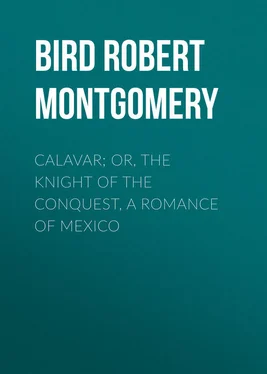Robert Bird - Calavar; or, The Knight of The Conquest, A Romance of Mexico
Здесь есть возможность читать онлайн «Robert Bird - Calavar; or, The Knight of The Conquest, A Romance of Mexico» — ознакомительный отрывок электронной книги совершенно бесплатно, а после прочтения отрывка купить полную версию. В некоторых случаях можно слушать аудио, скачать через торрент в формате fb2 и присутствует краткое содержание. Жанр: foreign_antique, foreign_prose, Историческая проза, на английском языке. Описание произведения, (предисловие) а так же отзывы посетителей доступны на портале библиотеки ЛибКат.
- Название:Calavar; or, The Knight of The Conquest, A Romance of Mexico
- Автор:
- Жанр:
- Год:неизвестен
- ISBN:нет данных
- Рейтинг книги:5 / 5. Голосов: 1
-
Избранное:Добавить в избранное
- Отзывы:
-
Ваша оценка:
- 100
- 1
- 2
- 3
- 4
- 5
Calavar; or, The Knight of The Conquest, A Romance of Mexico: краткое содержание, описание и аннотация
Предлагаем к чтению аннотацию, описание, краткое содержание или предисловие (зависит от того, что написал сам автор книги «Calavar; or, The Knight of The Conquest, A Romance of Mexico»). Если вы не нашли необходимую информацию о книге — напишите в комментариях, мы постараемся отыскать её.
Calavar; or, The Knight of The Conquest, A Romance of Mexico — читать онлайн ознакомительный отрывок
Ниже представлен текст книги, разбитый по страницам. Система сохранения места последней прочитанной страницы, позволяет с удобством читать онлайн бесплатно книгу «Calavar; or, The Knight of The Conquest, A Romance of Mexico», без необходимости каждый раз заново искать на чём Вы остановились. Поставьте закладку, и сможете в любой момент перейти на страницу, на которой закончили чтение.
Интервал:
Закладка:
" Demonios! were you long finding it out? Ever since the old archbishop burned his first heathenish volumes, he has done naught but – "
"I beg your pardon. – Burn his books? – the old archbishop? – Pray enlighten me a little on the subject of the good father's history.
"'Tis done in a moment," said Don Andres; "the only wonder is that he did not himself give you the story; that being, commonly, the prelude to his petition. The mother of Don Cristobal was an Indian damisela , delighting in the euphonical cognomen of Ixtlilxochitl; a name, which, I am told, belonged to some old pagan king or other, the Lord knows who – as for myself, I know nothing about it. But this set the padre mad, or, what's the same thing, it made him an historian. – 'Tis a silly thing to trouble one's noddle about the concerns of our granddads: let them sleep! rest to their bones — Asi sea! – They made him a licenciado, and then Cura of some hacienda or other, out among the hills – I know nothing about it. He wrote a book, in which he proved that the old heathen Montezuma, the great Cacique, was a saint, and Hernan Cortes, who conquered the land, a sinner. It may be so — Quien sabe? who knows? who cares? This was before the revolution – that is, before the first: (we have had five hundred since; – I never counted them.) Somehow, the viceroy Vanegas took a dislike to the book, and so did the archbishop. They set their heads together, got the good old fathers of the Brotherhood – (We have no Brotherhood now, – neither religious nor social: every man is his own brother, as the king says in the English play. – Did you ever read Calderon?) They got the old fathers to vote it dangerous, – I suppose, because they did not understand it. So they burned it, and commanded Johualicahuatzin – (that's another Indian king – so he calls himself. – His father was the Señor Marhojo, a creole, a lieutenant in the viceroy's horse, a very worthy Christian, who was hanged somewhere, for sedition. But Cristobal writes after his mother's name, as being more royal.) – What was I saying? Oh, yes! – They ordered the licentiate back to his hacienda. Then, what became of him, the lord knows; I don't. – Then came Hidalgo, the valiant priest of Dolores, with his raggamuffin patriots, – (I don't mean any reflection, being a patriot myself, though no fighter; but Hidalgo had a horrid crew about him!) Where was I? Oh, ay, – Hidalgo came to knock the city about our ears; and Cristobal, being seized with a fit of blood-thirstiness, joins me the gang. They say, he came with an old sabre of flint – I don't know the name; it belonged to some king in the family. Then Calleja, whom they made viceroy – the devil confound him! (He cut my uncle's throat, with some fourteen thousand others, at Guanaxuato, one day, to save powder.) – Calleja chased Hidalgo to Aculco, and, there, he beat him. Cristobal's brother (he had a brother, a very fine young fellow, a patriot major;) was killed at Cristobal's side; Cristobal was knocked on the head, – somebody said, with his own royal weapon: – I don't know, – where's the difference? They broke his skull, and took him prisoner. Y pues? what then? Being a notorious crazy man, and very savagely mauled, they did not hang him. Ever since, he has been madder than ever. He writes histories, and, to save them from viceroys, (he takes all our presidents for viceroys: to my mind, they are ; but that's nothing. You know Bustamente? a mighty great man: Santa Anna will beat him – but don't say so!) Well, to save his books from the president-viceroys, or viceroy-presidents, Cristobal offers them to every body he meets, with a petition to take them over the seas and publish them. – That's all! – The Indians at the hacienda love him, and take care of him. – Ha, ha! he caught you, did he? What did he say?"
"He gave me his books," said the traveller.
" Fuego! you took them? Ha, ha! now will the poor padre die happy!"
"I will return them to his relations."
"Relations! they are all in heaven; he is the last of the Ixtlilxochitls! Ha, ha! I beg your pardon, amigo mio! I beg your pardon; but if you offer them to any body, never believe me, but folks will take you for Cristobal the Second, el segundo maniatico , or some one he has hired to do the work of donation. Ha, ha! cielo mio, pity me! say nothing about it; – burn them."
"At least, let us look over them."
" Olla podrida! look over a beggar's back! a pedler's sack! or a dictionary! – Any thing reasonable. Burn them; or take them to America, to your North, and deposit them in a museum, as the commonplace books of Montezuma. Vamos; que me manda vm.? will you ride to the Alameda? – Pobre Cristobal! he will die happy – "
The traveller returned to his own land: he bore with him the books of Cristobal. Twenty times did he essay to make examination of their contents, and twenty times did he yawn, in mental abandonment, over their chaotic pages, – not, indeed, that they seemed so very incoherent in style and manner, but because the cautious historian, as it seemed, with a madman's subtlety, had hit upon the device of so scattering and confusing the pages, that it was next to impossible that any one, after reading the first, should discover the clue to the second. Each volume, as has been hinted, consisted of a single great sheet, folded up in the manner of a pocket map; both sides were very carefully written over, the paragraphs clustered in masses or pages, but without numbers; and, but for the occurrence, here and there, of pages of hideous hieroglyphics, such as were never seen in a Christian book, the whole did not seem unlike to a printed sheet, before it is carried to the binder. The task of collating and methodising the disjointed portions, required, in the words of the padre himself, the devotedness which he had figured as 'the patient martyrdom of an almanac-maker;' it was entirely too much for the traveller. He laid the riddle aside for future investigation: but Cristobal was not forgotten.
A year afterwards, in reading a Mexican gazette, which had fallen into his hands, his eye wandered to the little corner which appeals so placidly to the feelings of the contemplative, – the place of obituaries. His attention was instantly captivated by a name in larger characters than the others. Was it? could it be? Pobre Cristobal! – ' El Licenciado Cristobal Santiago Marhojo y Ixtlilxochitl, Cura de la Hacienda de Chinchaluca, ordinariamente llamado El Maniatico Historiador' – . The same! But what is this? the common immortality of a long paragraph? – The heretic rubbed his eyes. "Several MSS., historical memoirs, relating to the earlier ages of the Aztec monarchy, the work of his own hand, have been discovered; and a lucky accident revealing the expedient which he adopted to render them illegible, or at least inexplicable to common readers, they have been found to be in all respects sane and coherent, the work less of a madman than an eccentric but profound scholar. The pages are arranged like those in the form of the printer; and, being cut by a knife without unfolding – " The heretic started up, and drew forth the long-neglected tomes. – "It is said that a North American, a year ago, received, and carried away, many of the volumes, which the eccentric clergyman was accustomed to offer to strangers. It is hoped, if this should meet his eye – " 'Enough! if thy work be at all readable, departed padre, it shall have the new coat!'
Great was the surprise of the philosopher, when having, at the suggestion of the gazetteer, cut the folded sheet of a volume, he beheld the chaos of history reduced to order. There they were, the annals of Aztecs and Toltecs, of Chechemecs and Chiapanecs, and a thousand other Ecs , from the death of Nezahualcojotl, the imperial poet, up to the confusion of tongues. "Here's a nut for the philosophers," quoth the traveller; "but now for a peep at Montezuma! – Poor Cristobal! what a wonderful big book you have made of it!"
Читать дальшеИнтервал:
Закладка:
Похожие книги на «Calavar; or, The Knight of The Conquest, A Romance of Mexico»
Представляем Вашему вниманию похожие книги на «Calavar; or, The Knight of The Conquest, A Romance of Mexico» списком для выбора. Мы отобрали схожую по названию и смыслу литературу в надежде предоставить читателям больше вариантов отыскать новые, интересные, ещё непрочитанные произведения.
Обсуждение, отзывы о книге «Calavar; or, The Knight of The Conquest, A Romance of Mexico» и просто собственные мнения читателей. Оставьте ваши комментарии, напишите, что Вы думаете о произведении, его смысле или главных героях. Укажите что конкретно понравилось, а что нет, и почему Вы так считаете.












